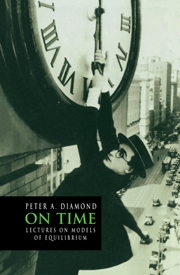Preface
Published online by Cambridge University Press: 31 December 2009
Summary
I have been researching the inadequacies of conventional approaches to the modeling of time since 1968. My dissatisfaction with treatments of tatonnement stability led me to think about price adjustments in real time, with individuals aware that they are partaking in a process in real time. This approach to modeling equilibrium resulted first in my 1971 analysis of search equilibrium in a single market. Reading Mortensen (1978) made me realize the power of Poisson processes for developing tractable models of real time activities and moved my concern for real time allocation processes into a more productive phase. These lectures represent an attempt to express the image of the workings of an economy that lies behind much of my research. Being invited to give these lectures pushed me into a reflection on modeling that would not have occurred otherwise.
The book is divided into two lectures; each lecture is divided into two chapters. In the lecture about individual industries, I begin by considering explicit modeling of time in a competitive setting where investment and production are the only decisions by firms; the Walrasian auctioneer handles prices. The thrust of the lecture is how atemporal modeling is (and must be) informed by explicittime thinking and modeling. This is illustrated by a model with uncertainty about the production costs of individual firms and is argued by consideration of data on gross and net employment flows. The second chapter moves beyond this structure by recognizing price setting as a control variable of individual suppliers, dropping the fiction of the Walrasian auctioneer.
- Type
- Chapter
- Information
- On TimeLectures on Models of Equilibrium, pp. xi - xiiPublisher: Cambridge University PressPrint publication year: 1994

